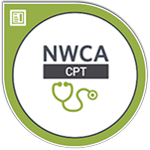PURPOSE
This credential is designed to document the knowledge base for phlebotomists who work in a variety of settings, including those who are a part of the laboratory team, paramedics, and point-of-care healthcare workers.
AUDIENCE
This credential is appropriate the healthcare workers who assist in patient care by taking blood, urine, and other body fluid samples so that they can be analyzed by a medical lab to assist the physician or other provider in clinical decision making for diagnosis, treatment, and monitoring of health parameters. Phlebotomists work in hospital labs and those of other residential facilities (long-term care facilities, specialty hospitals, urgent care facilities, psychiatric facilities) in ambulatory and outpatient settings (physician offices, clinics, home health care agencies, hospice agencies, prison health clinics, school-based clinics, dialysis centers, screening centers, durable medical equipment suppliers, HMOs, community health centers, specialty practices, rehabilitation settings, sports medicine settings, drug testing centers), and in mobile settings (mobile vans for blood donations, mammography, workplace testing, forensic toxicology labs, etc.)
JOB/CAREER REQUIREMENTS
Areas of assessment include the phlebotomist’s role and profession, infection control and safety, quality assurance, anatomy and physiology, medical terminology, phlebotomy equipment and procedures, point-of-care testing, and special populations and procedures. This credential documents development of skills for healthcare professionals who collect blood, urine, fecal specimens, seminal fluid, sputum, and other body specimens. They collect, label, package, transport, use lab equipment to test, enter data into computers, report on, and store body fluid specimen. Phlebotomists are employed in general medical and surgical hospitals, specialty hospitals, medical and diagnostic laboratories, ambulatory health care services, physicians offices, insurance carriers, state government offices, home health care services, blood donation facilities, and other facilities.
PHLEBOTOMY TECHNICIAN WORKPLACE TASKS:
- Identify patients correctly
- Verify orders
- Talk with patients and donors so they are less nervous about having their blood drawn
- Assess the patient prior to collection to ensure there are no contraindications to performing the procedures
- Prepare the patient appropriately for each procedure and inform the patient of the procedure
- Perform the procedure properly using the correct equipment and supplies
- Label specimen containers properly
- Assess the patient after the procedure
- Perform quality control functions
- Enter patient information into a database
- Transport specimens correctly and in a timely manner
- Prepare/process the samples for testing/analysis
- Assist in laboratory testing procedures
- Assemble and maintain medical instruments used in procedures
- Wash glassware and clean equipment and facilities
- Print/collate/distribute laboratory requisitions and reports
- Answer phones
- Practice customer service
EXAM STRUCTURE OVERVIEW
Number of Questions in Exam: 60
Total Time: 60 minutes
Overall Passing Score: 70%
(All sections require an individual passing score of 70%)

